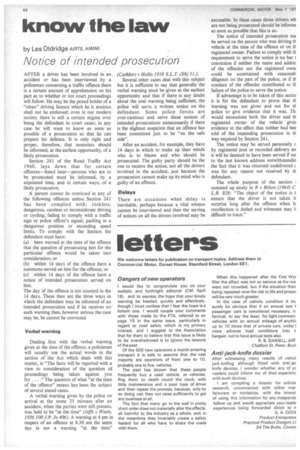know the law
Page 66

If you've noticed an error in this article please click here to report it so we can fix it.
by Les Oldridge AIRTE, AMIMI
Notice of intended prosecution
AFTER a driver has been involved in an accident or has been interviewed by a policeman concerning a traffic offence there is a certain amount of apprehension on his part as to whether or not court proceedings will follow. He may be the proud holder of a "clean" driving licence which he is anxious shall not be endorsed; even in our modern society there is still a certain stigma over being the defendant in court cases; in any case he will want to know as soon as possible of a prosecution so that he can prepare his defence. It is only right and proper, therefore, that motorists should be informed, at the earliest opportunity, of a likely prosecution.
Section 241 of the Road Traffic Act 1960, lays down that for certain offences—listed later—persons who are to be prosecuted must be informed, by a stipulated time, and in certain ways, of a likely prosecution.
A person cannot be convicted in any of the following offences unless Section 241 has been complied with: reckless, dangerous, careless or inconsiderate driving or cycling; failing to comply with a traffic sign or police officer's signal; parking in a dangerous position or exceeding speed limits. To comply with the Section the defendant must have:
(a) been warned at the time of the offence that the question of prosecuting him for the particular offence would be taken into consideration; or (b) within 14 days of the offence have a summons served on him for the offence; or (c) within 14 days of the offence have a notice of intended prosecution served on him.
The day of the offence is not counted in the 14 days. These then are the three ways in which the defendant may be informed of an intended prosecution and if he receives no* such warning then, however serious the case may be, he cannot be convicted.
Verbal warning Dealing first with the verbal warning given at the time of the offence, a policeman will usually use the actual words in the section of the Act which deals with this matter, ie "The facts will be reported with a view to consideration of the question of proceedings being taken against you for. . .." The question of what "at the time of the offence" means has been the subject of several stated cases.
A verbal warning given by the police on arrival at the scene 35 minutes after an accident, when the parties were still present, was held to be "at the time" (Jeffs v Weels, 1936 100 J.P. Jo 406). A warning at 4 pm in respect of an offence at 8.30 am the same day is not a warning "at the time" (Cuthbert v Hollis 1958 S.L.T. (Sh) 51.).
Several other cases deal with this subject but it is sufficient to say that generally the verbal warning must be given at the earliest opportunity and that if there is any doubt about the oral warning being sufficient, the police will serve a written notice on the defendant. Some police forces are over-cautious and serve these notices of intended prosecutions unnecessarily if there is the slightest suspicion that an offence has been committed just to be "on the safe side".
After an accident, for example, they have 14 days in which to ,make up their minds who is to blame and who should be prosecuted. The guilty party should be the one to receive the notice, not all the drivers involved in the accident, just because the prosecution cannot make up its mind who is guilty of an offence.
Delays
There are occasions when delay is inevitable, perhaps because a vital witness cannot be interviewed and then the serving of notices on all the drivers involved may be excusable. In these cases those drivers wh are not being prosecuted should be informe as soon as possible that this is so.
The notice of intended prosecution ma be served on the person who was driving th vehicle at the time of the offence or on th registered owner. Failure to comply with th requirement to serve the notice is no bar t conviction if neither the name and addre: of the offender nor the registered owm could be ascertained with reasonabl diligence on the part of the police, or if th conduct of the offender contributed to di failure of the police to serve the notice.
If advantage is to be taken of this sectio it is for the defendant to prove that di warning was not given and not for th police to give evidence that it was. Tit would necessitate both the driver and th registered owner of the vehicle givin evidence to the effect that neither had bee told of the impending prosecution in th way required by Section 241.
The notice may be served personally c by registered post or recorded delivery an it will be deemed to have been served if set to the last known address notviithstandin the fact that it was returned undelivered c was for any reason not received by th defendant.
The whole purpose of the section I summed up nicely in R v Baton (1964) C L.R. 828: "The object of the notice is t ensure that the driver is not taken b surprise long after the offence when hi recollection is dulled and witnesses may b difficult to trace."










































































































































































































